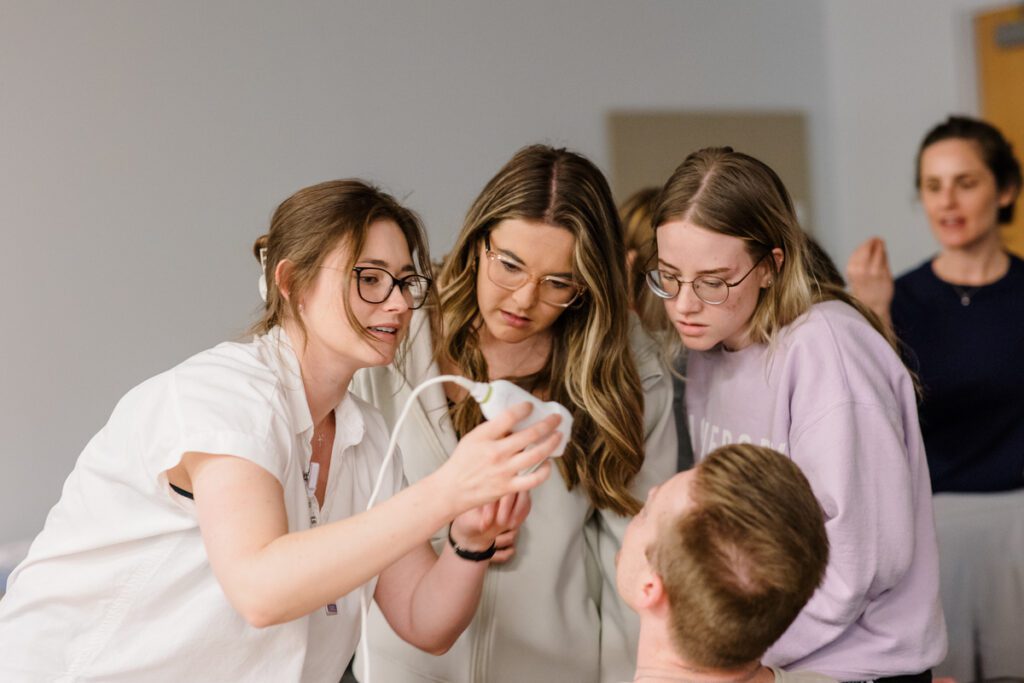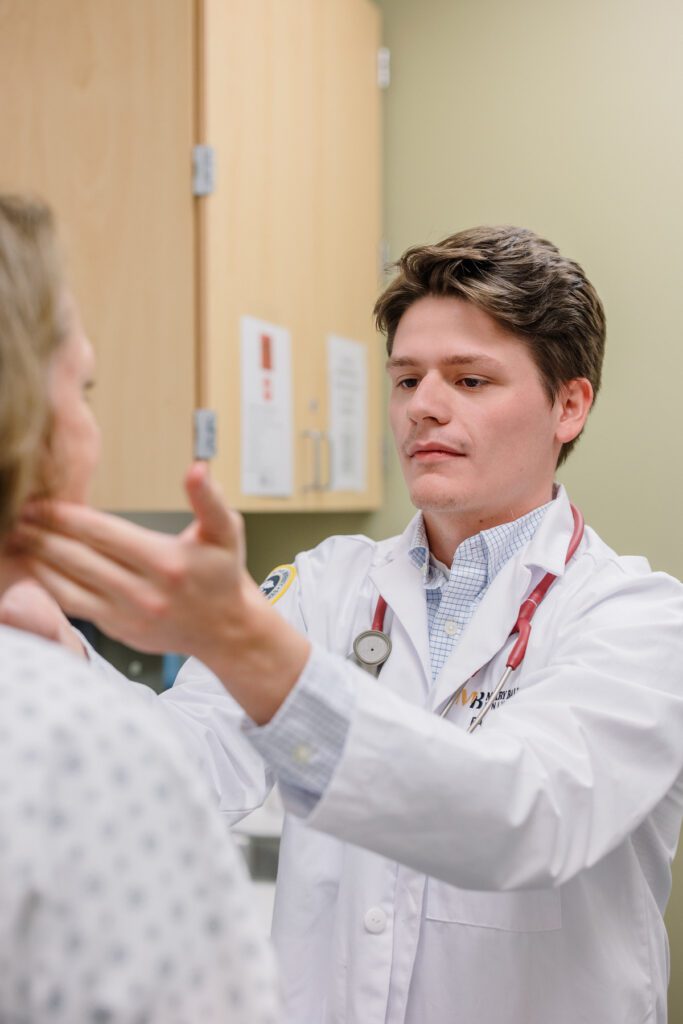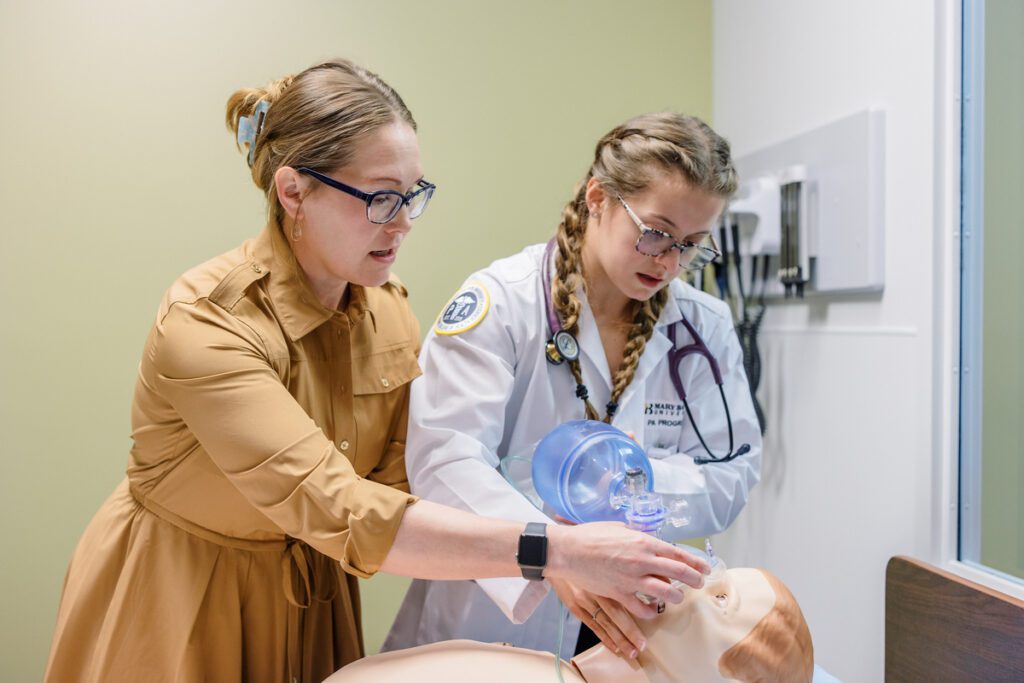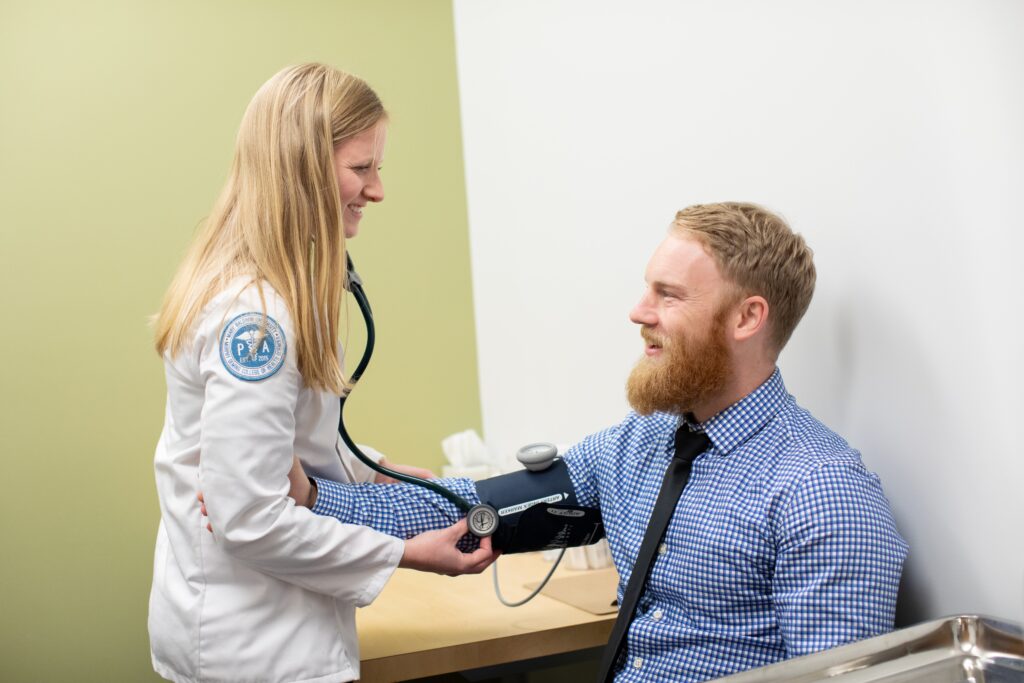Physician Assistant (MSPA)
Empowering compassionate clinicians.
Physician assistants (PAs) are highly trained healthcare professionals who work under the supervision of doctors of medicine or osteopathy. The collaborative relationship between physicians and PAs is crucial to delivering high-quality healthcare. PAs have the knowledge and skills to make clinical decisions, offer various diagnostic, therapeutic, preventive, and health maintenance services. They play a vital role in primary and specialty care across medical and surgical settings.
- Time to Completion27 months
- FormatOn Campus
- Degree(s)Master of Science in Physician Assistant (MSPA)
- CASPA OpensApril 24
- CASPA ClosesOctober 1
- Program StartJanuary
Next steps


Why Earn a Physician Assistant (MSPA) Degree at Mary Baldwin?
The role of the physician assistant demands intelligence, sound judgment, interpersonal skills, and the capacity to react to emergencies in a calm and reasoned manner. PAs perform physical examinations, diagnose and treat illnesses, order and interpret lab tests, assist in surgery, and provide patient education and counseling. As a highly regarded PA program in Virginia, the master of science in physician assistant program at Mary Baldwin embraces the team-based, collaborative, and interprofessional approach to patient care.
Faculty with Proven Expertise
Learn and be mentored by accomplished scholars and practitioners. Many of our faculty members have upwards of 20 years of experience in the field, and most are still active in PA practice. Our faculty’s areas of specialty include family medicine, sports medicine, surgery, emergency medicine and urgent care, pediatric advocacy, preventative medicine, and more.
Shared Experience
Studying in a cohort model means that you’ll start and finish the PA program with the same group of fellow students, so you’ll find a strong community of support as you complete your courses. You’ll also get to work together in special interprofessional case study groups, research, and clinical skills scenarios.
Collaborative Training
Collaboration extends to students from other disciplines like occupational therapy, physical therapy, medicine, nursing, and social work. Our PA program’s curriculum prepares our graduates to practice the highest quality patient care in a rapidly changing healthcare environment.
Immersive Experiences in the Field
Through our partnership with local community hospitals and healthcare organizations, PA students are able to begin clinical experiences immediately. This access enables them to build communication, relationship, and clinical skills right off the bat during their first year. Overall, our program emphasizes spending more hours in the field to better prepare you for future practice.
- 100% of MBU graduates ultimately passed the PA national exam (2022)
- 100% of MBU graduates employed within six months of earning their PA degree (2021)
Next steps
I cannot begin to express how prepared I felt entering the workforce after completing MBU’s PA program. I’m a new graduate functioning independently and serving as a sole provider managing a variety of conditions at a very busy, very well-established practice.
Montana Weitzel, MSPAClass of 2021
Courses and Curriculum
All didactic courses (15 months of instruction) will utilize the most appropriate and up-to-date instructional techniques, including lecture/discussion, interprofessional group and problem-based discussion, case studies, presentations, clinical skill scenarios, and hospital-based experiences.
The clinical phase follows the didactic and is 12 months in length. Students will study in six-week rotations with practitioners in the areas of family medicine, internal medicine, emergency medicine, pediatrics, women’s health, behavioral medicine/mental health, and general surgery.

Murphy Deming Student Services
Our team is dedicated to ensuring Murphy Deming students receive a high-quality student experience and support for their well-being, development, engagement, and success.

Cost & Financial Aid
A great education is worth it. Our mission is to help you level up and bring your aspirations to life.
Career opportunities
PAs work in various areas of practice, including:
- 13.1% in family medicine, addressing a wide range of conditions, emphasizing prevention, and providing continuity of care while serving their communities
- 9.7% in orthopaedic surgery, supporting musculoskeletal procedures and providing care in emergency departments and urgent care centers, or serving as care coordinators
- 7.4% in emergency medicine, examining and evaluating patients; ordering and interpreting lab tests; and diagnosing and treating in the ER
- 6.5% in urgent care, providing immediate outpatient medical care for acute and chronic illness and injury
- 4.6% in general internal medicine, addressing the diagnosis, treatment, and care of adults, ranging from healthy individuals to those with complex illnesses
- 3.3% in dermatology, evaluating, diagnosing, and treating a wide variety of skin-related health conditions, both medically and surgically
- 3.1% in cardiology, working in a variety of settings among diverse patient populations and helping to meet the increasing demand for cardiovascular care
- Additionally, 1-2 % of PAs respectively reported specialties in each of the following areas: hospital medicine, psychiatry, critical care, education, obstetrics and gynecology (OBGYN), or administration.
Source: AAPA Areas of Practice Guide, based on the 2023 AAPA Salary Survey and Report concerning primary PA roles
Next steps
Professional Licensure Disclosure
Mary Baldwin University only accepts students from areas where it meets the
educational requirements for licensure. If you’re interested in admission but not currently located in one of these areas, please reach out to admissions or the program director to have a conversation about your individual situation. We’re happy to help you think through the requirements.
For information on which states and territories our program meets the educational
requirements for licensure by location, visit the MBU Catalog.
NOTE: Completion of an authorized educational program does not guarantee licensure or certification. States and territories may have additional requirements such as a background check, jurisprudence examination, other specific training requirements, recommendations, etc.
Mary Baldwin University recommends that students consult the appropriate licensing agency or board in the respective state or territory they intend to practice before beginning any academic program or coursework. Links to state license information can be found at https://catalog.marybaldwin.edu/institutional-professional-licensurerequirements. If students experience difficulty finding the license requirements for a specific state or territory, please contact the program director or admissions.
The PA program has determined that its curriculum meets the state educational requirements for licensure or certification in all states and the District of Columbia.
Student Consumer Information
MBU provides postsecondary education and employment data to help students make informed consumer decisions. Current and prospective MBU students may find information and resources useful in planning for college and careers through the MBU profile published by the State Council of Higher Education for Virginia (SCHEV).
More on student consumer information and SCHEV profile at https://catalog.marybaldwin.edu/hb-886-compliance.
Technical Standards
View the Minimum Technical Standards for Admissions, Continuation, and Graduation for the PA program here.
Policy/Student Handbook
The program maintains a policy/student handbook available to enrolled students. This includes policies of remediation, deceleration, withdrawal, leave of absence, progression, and completion.
MBU is made for you.
How will you make your mark?
Mary Baldwin University only accepts students from areas where it meets the educational requirements for licensure. If you’re interested in admission but not currently located in one of these areas, please reach out to admissions or the program director to have a conversation about your individual situation. We’re happy to help you think through the requirements.
For information on which states and territories our program meets the educational requirements for licensure by location, visit the MBU catalog.
NOTE: Completion of an authorized educational program does not guarantee licensure or certification. States and territories may have additional requirements such as a background check, jurisprudence examination, other specific training requirements, recommendations, etc.
Mary Baldwin University recommends that students consult the appropriate licensing agency or board in the respective state or territory they intend to practice before beginning any academic program or coursework. Links to state license information can be found at https://catalog.marybaldwin.edu/institutional-professional-licensure-requirements. If students experience difficulty finding the license requirements for a specific state or territory, please contact the program director or admissions.
Student Consumer Information
MBU provides postsecondary education and employment data to help students make informed consumer decisions. Current and prospective MBU students may find information and resources useful in planning for college and careers through the MBU profile published by the State Council of Higher Education for Virginia (SCHEV).